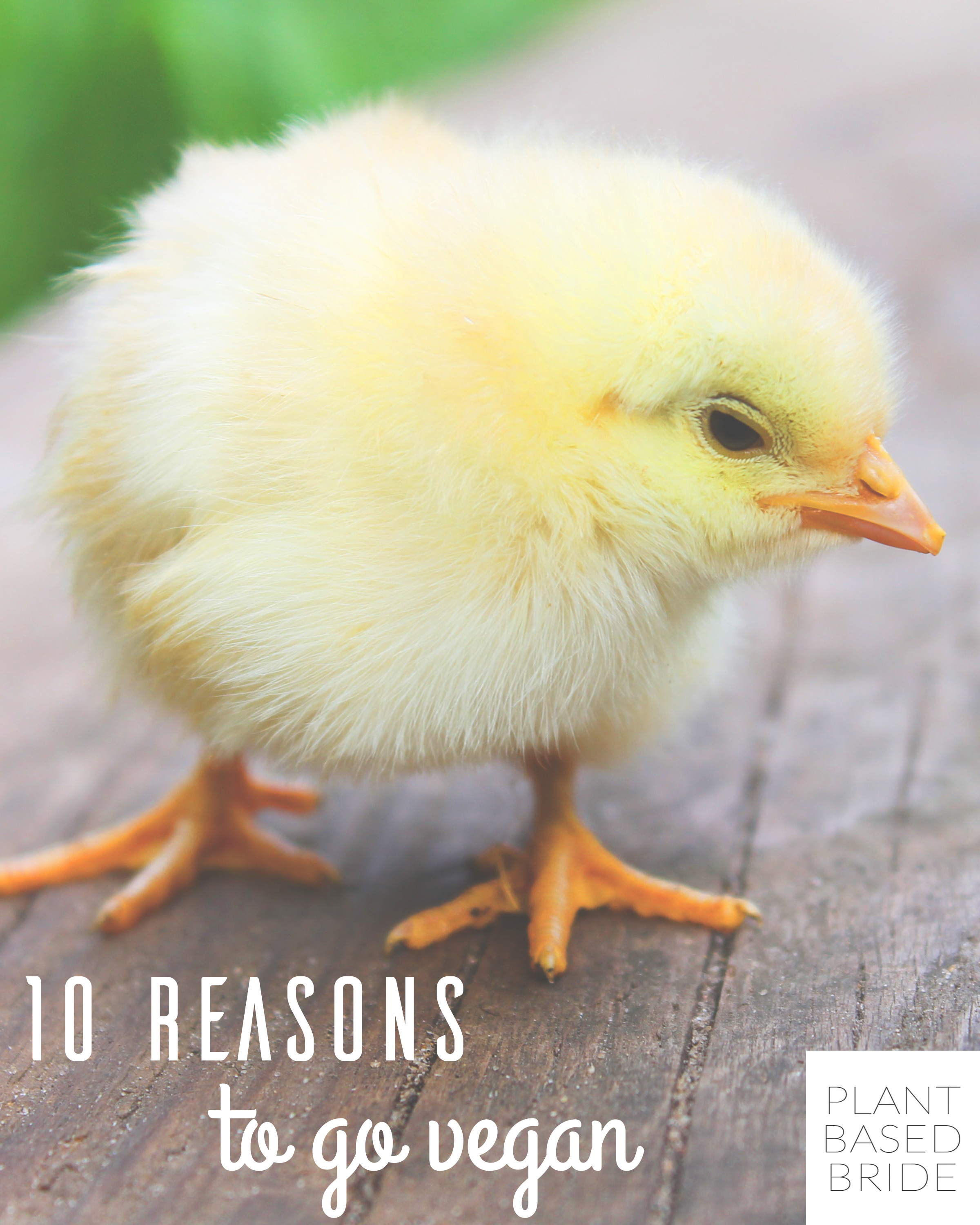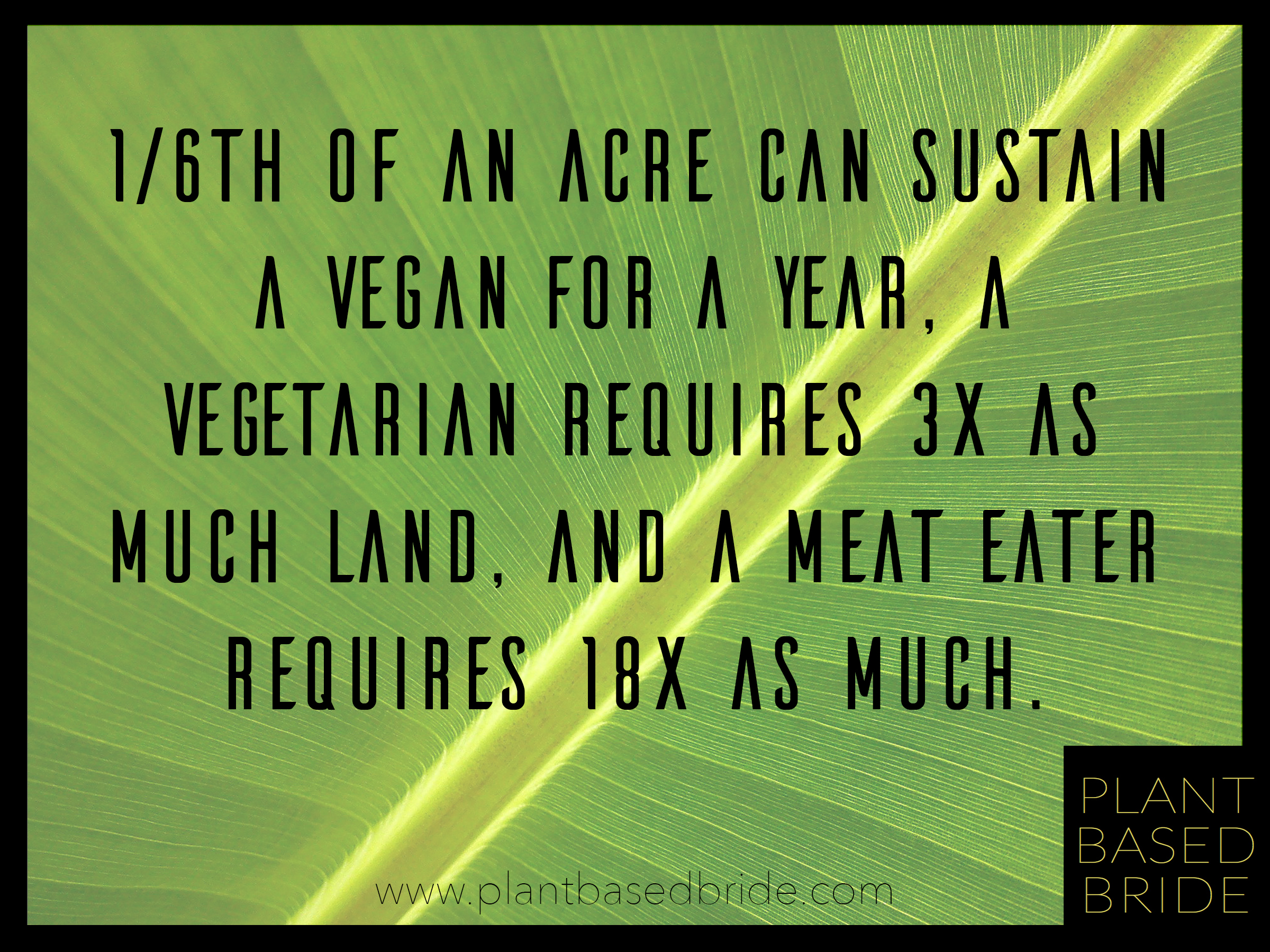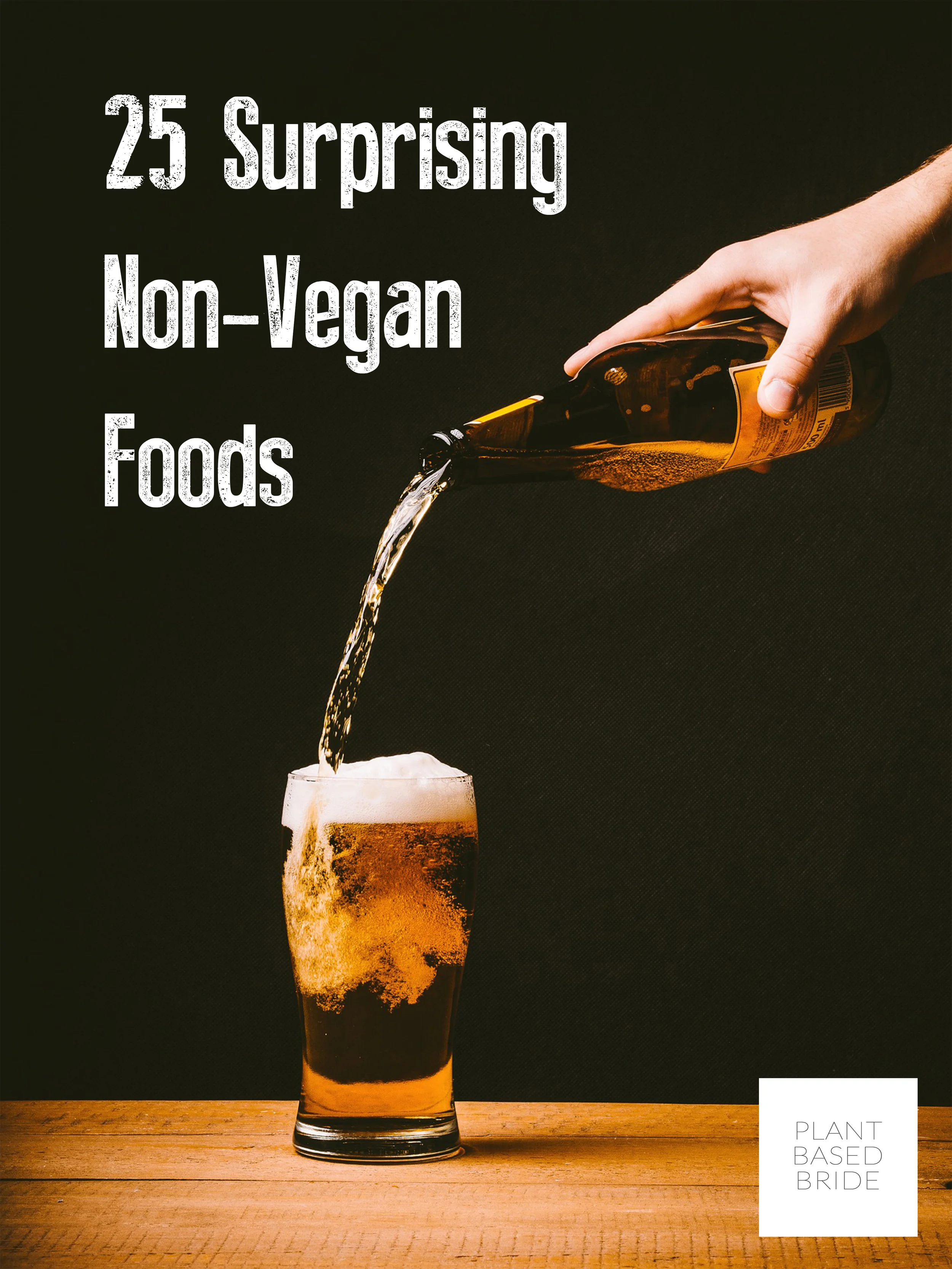
the blog.
10 Reasons to Go Vegan!
Are you sitting on the fence, unsure about taking the leap into veganism? I understand. It took me 8 months of debating and researching after going vegetarian before I made the change. Now I wish that I'd gone vegan years earlier! As they say, hindsight is always 20/20. Perhaps you'll benefit from my hindsight by reading my top 10 reasons to go vegan!
Are you sitting on the fence, unsure about taking the leap into veganism? I understand. It took me 8 months of debating and researching after going vegetarian before I made the change. Now I wish that I'd gone vegan years earlier! As they say, hindsight is always 20/20. Perhaps you'll benefit from my experience by checking out my top 10 reasons to go vegan! (This post contains some affiliate links.)
1. Improve Your Health - Cutting out animal products is good for you! Meat and dairy products are full of hormones, antibiotics, cholesterol, and acidify the body. (Check out this post for a brief explanation of body pH). With a diet consisting of whole plant foods you are all but guaranteed to get sufficient amounts of the nutrients you need, as long as you get a wide variety. (There is a debate on how available B12 is in a vegan diet, so I make sure to take a supplement.) Eating a diet high in fibre, low in fat, and full of vitamins and minerals will lower your risk of diabetes, heart disease, high blood pressure, Alzheimer's, and a whole host of cancers. So ditch the animal products and eat your vegetables!
Want to know more about the health benefits of going plant based? Check out some of my favourite books on the topic:
2. Lose Weight - Have a goal to drop a couple of pounds? Consider going vegan! Vegans are 10-20 lbs lighter than meat eaters, on average, and have lower rates of obesity. Eating foods that are lower on the caloric density scale (like fruits and vegetables) more often can lead to almost effortless weight loss.
Interested in how to lose weight on a vegan diet? Rip Esselstyn's book is a great one to check out:
3. Save Animals' Lives - Are you an animal lover? Then why discriminate between species? Did you know that pigs can learn to play video games and are smarter than dogs? Did you know that the intelligence of chickens has been compared to that of monkeys? Did you know that cows have best friends and get stressed when they are separated from them? One vegan saves more than 100 animals a year. You'll love the feeling you get knowing that you no longer contribute to the killing of any sentient beings for your nourishment!
Want to learn more about the animals commonly killed for your food? Check out this article about the emotional lives of cows, this one about the intelligence of chickens, and this one about pigs showing how incredibly smart and adorable they are.
4. Stop Animal Cruelty - Factory farms are horrible places. Animals are stuffed into wire cages and metal crates within windowless, filthy, buildings to live out their short, unhappy lives. They never get to raise their offspring, build complex social relationships, or interact with their natural environment. Many will never feel the warmth of the sun or breathe fresh air. Factory farms are run as a business dealing in a commodity, not living creatures. Their goal is increasing profit, not the quality of life of their captives. The more animals they can squeeze in, the more money they can make; even with the increased death toll from disease and infection. And if the plight of animals doesn't move you, think about yourself. Did you know that the meat you eat is often contaminated with feces, blood, and other bodily fluids; causing many cases of food poisoning around the world? Or that the antibiotics pumped into animals to prevent excessive death from their subpar living conditions is having a negative impact on your health when you consume their flesh?
It's time to open your eyes to what animal agriculture has become. Ready to learn the truth about where your food comes from? Check out the documentary Earthlings or read the book that made me go vegan:
5. Help People - Factory farming doesn't just hurt animals, it also has a negative impact on the workers and the people who live in close proximity to their facilities. The large amounts of feces sprayed into the air by these farms have resulted in huge increases in human respiratory problems, and the new, resistant, bacterial strains developed due to the overuse of antibiotics in animals are a serious threat to human health all around the world. Poor sanitation and waste management can lead to E.coli and salmonella contamination in our food supply, causing millions to become sick each year, and even die. Zoonotic diseases, those that can be transmitted from animals of other species to humans, like swine flu, are caused by overcrowding and poor waste management on factory farms and result in many human deaths.
Not only does going vegan reduce these negative effects, but it can have a wonderful, global, impact on feeding the hungry. It is estimated that almost a billion humans are suffering from hunger, and almost 900 million of malnutrition. Every year, starvation is the cause of death for over 2.5 million children under the age of five. But we are producing enough food to feed every single human being on earth! So where is all of that food going? A study in 2013 from scientists at the Institute on the Environment and the University of Minnesota demonstrated that if all food crops grown on earth were fed directly to humans, rather than to our livestock, approximately 70% more food would become available for human consumption, feeding 4 billion additional people. This surplus would not only feed the billion hungry people on earth, but an additional 3 billion people, an important fact when studies of human population growth estimate an increase of 3 billion people in less than 100 years.
Still not convinced? Let me break it down further. Cows are not very efficient at turning the food they eat into muscle. This is clear when you look at the numbers: one pound of beef (cow muscle) requires 13-20 pounds of grain to be produced. Put another way, 13-20 times more people could be fed if the grains were eaten directly, rather than to the cow. While pigs and chickens are slightly more efficient, it still requires 7 pounds of grain to produce one pound of pork and 4.5 pounds of grain to produce one pound of chicken. Why are any of the people passionately speaking out about world hunger continuing to eat meat?
Read more about feeding the hungry with plants here and for further information about the negative impact of factory farms on people, see here.
6. Save The Planet - There is no other human action with a greater negative impact on the environment than the raising of livestock for human consumption: the meat industry contributes as much as 51% of man-made pollution, more than all forms of transportation combined (sitting at around 13%). Not only that, but methane gas from livestock is 25-100 times more destructive to the atmosphere than carbon dioxide from vehicles. Did you know that even if we stopped all use of gas, oil, or fuel from today onwards, we would still exceed our maximum carbon equivalent greenhouse gas emissions (565 gigatons) by 2030, exclusively from the raising and eating of livestock? Reducing methane emissions makes an almost immediate (within decades) impact on methane levels in the atmosphere, while reducing CO2 emissions doesn't have a significant effect for as long as 100 years.
One calorie of beef requires 160 times more land to produce than one calorie of potatoes or rice, and causes 11 times more greenhouse gas emissions. Overspilled manure from farm land increases the phosphorus and nitrogen levels in the water supply, reducing oxygen levels and killing aquatic life. Deforestation for the use of livestock farming and agriculture of feed crops (the cause of 91% of the destruction of the planet's rainforests) emits approximately 2.4 billion tons of CO2 yearly. A quatre pound hamburger takes over 660 gallons of water to produce (the equivalent of showering for 2 months straight). 116,000 pounds of excrement is produced every second in the United States alone from farmed animals. Animal agriculture uses 1/3 of the world's fresh water and 45% of the earth's land. Going vegan is the absolute best way to reduce your impact on the environment and do your part to save our planet.
Want to learn more about the environmental impact of animal agriculture? Watch Cowspiracy, an incredible documentary on the subject.
7. Plant Based Food Is Delicious - And I don't just mean meat and dairy substitutes or desserts. After a couple of weeks on a vegan diet you will notice your taste buds change and will be able to distinguish and appreciate the subtly delicious tastes of plant foods in their natural state! (Although, coconut ice cream is to die for.) I dare you to go to a vegan restaurant in your city and not find something delicious!
Want examples of mouth-watering vegan dishes? Look no further than these instagram accounts.
8. Live Longer - Thrive on a vegan diet for years longer than your meat eating friends. Vegans have been shown to live as many as 9 years longer than omnivores due to reduced deaths from illnesses like cancer and heart disease and increased health and vitality from an abundance of nutrients. What could you accomplish in an extra decade of life? Why not find out!
9. Join The Ranks - Did you know that Ellen DeGeneres, Portia de Rossi, Kristen Bell, Natalie Portman, Kate and Rooney Mara, Jessica Chastain, Emily Deschanel, Ellen Page, Jared Leto, Michelle Pfeiffer, Carrie Underwood, and Alicia Silverstone are all vegan? The movement isn't just full of celebrities. Many incredible athletes have made the switch: Brendan Brazier, Robert Cheeke, Rich Roll, Robert Hazely, Georges Laraque, Carl Lewis, Jack Lindquist, Mike Mahler, Patrick J Neshek, Fiona Oakes, Amanda Reister, Jim Morris, and so many more!
If celebrities under all of the pressures of Hollywood and athletes competing at international levels can thrive on a plant based diet, why can't you?
Related Blog Post: Vegans vs Protein
10. Be Happier - Go vegan for a healthy mind: you'll have lower incidences of anxiety and depression than meat eaters! Magnesium, which is plentiful in plant foods and virtuality non-existent in animal products, is important for energy, improving sleep, and regulating your mood while reducing headaches.
You'll also be happier knowing that every single day you're saving 1100 gallons of water, 45 pounds of grain, 30 square feet of forest, 20 pounds of CO2, and one animal's life. Every single day. If you could make that kind of positive impact on the world, would you?
You can. No other choice has such a profound impact on the health of the planet in every single aspect.
Make a change. Go vegan!
Until next time,
Which reason resonates the most with you? Why did you go vegan? Let me know in the comments below!
Subscribe to the Plant Based Bride newsletter to never miss a blog post. Find the form at the bottom of this page!
25 Surprising Non-Vegan Foods
It can be intimidating to go vegan. Believe me, I know! After 8 months as a vegetarian and researching veganism almost daily I thought I knew without a doubt what foods were and were not vegan. Unfortunately, I was wrong. Over the past 2 and a half years eating a plant based diet I have come across many non-vegan foods that shocked me. And while I was lucky enough to discover the majority of these foods before eating them, not everyone does. Food companies love to include animal products in everything, and I mean EVERYTHING. They even sneak them into "vegan" products! Here is a list of 25 surprising non-vegan foods to avoid.
It can be intimidating to go vegan. Believe me, I know! After 8 months as a vegetarian and researching veganism almost daily I thought I knew without a doubt what foods were and were not vegan. Unfortunately, I was wrong. Over the past 2 and a half years eating a plant based diet I have come across many non-vegan foods that shocked me. And while I was lucky enough to discover the majority of these foods before eating them, not everyone does. Food companies love to include animal products in everything, and I mean EVERYTHING. They even sneak them into "vegan" products! Here is a list of 25 surprising non-vegan foods to avoid.
- Beer... many brands use a membrane derived from the bladders of fish to filter their brews. Check out Barnivore to find out if your favourite beer (or wine, or liquor) is cruelty-free!
- White Sugar... some brands process their sugar using bone char to give it its bright white colour (watch out for brown sugar too; it may be processed as white sugar and then have molasses added to make it brown). Always buy beet sugar (not refined using bone char) or organic cane sugar (bone char is not considered organic).
- Non-Dairy Creamer... can contain milk-derived ingredients such as caseinate.
- Red Dye... a popular brand of red dye called Carmine (often listed as Natural Red #4 in ingredient lists) is coloured using the scales of tiny insects.
- Jello... contains gelatin which is derived from animal bones, connective tissues, and organs.
- Vitamin D Fortified Foods... the source of vitamin D may be lanolin, derived from sheep's wool.
- Chewing Gum... often contains animal-derived glycerin.
- Cake Mix... may contain beef fat (often listed as lard in the ingredients).
- Worcestershire Sauce... traditionally contains anchovies.
- Apple Juice... may be clarified with isinglass (obtained from the dried swim bladders of fish). This one I find especially disturbing, having been a HUGE apple juice fan as a child.
- Jam... may contain gelatin.
- Tortillas... traditionally made with lard.
- Marshmallows... often contain gelatin.
- Margarine... may contain gelatin, casein (milk protein), or whey.
- Frosted Mini Wheats... contains gelatin.
- BBQ Chips... may contain traces of milk or animal fat.
- Vitamins and Supplements... often contain animal products. Read the ingredients carefully!
- Orange Juice... can be fortified with omega 3s derived from fish.
- Refried Beans... traditionally made with lard.
- Bagels... the enzyme L. Cysteine is used as a dough conditioner and is derived from poultry feathers.
- Packaged Peanuts... may contain gelatin.
- Soy Cheese... may contain casein. Just because a product's only purpose would seem to require its veganism does not mean it's animal product free! Make sure to read the ingredients carefully, even on "vegetarian" and "vegan" products.
- Altoids... contain gelatin.
- Pad Thai... often contains fish sauce. Be sure to ask!
- French Fries... may be fried in animal fat.
You Might Also Like: 10 Reasons To Go Vegan!
Lucky for us many brands provide vegan options of these foods. Make use of google and sites like Vegetarians in Paradise to investigate brands or products, and always read the ingredients!
Until next time,
Which food surprised you most? Is there a surprisingly non-vegan food I missed? Let me know in the comments below!
Also, be sure to use the sign up form at the bottom of the page to get updates from me and new blog posts right to your inbox!
Vegans vs Protein
Ah, the age-old question. The first 6 words people say after learning that I don't eat animal products; the concern used as an excuse for complete strangers to me give health and nutrition advice, sans qualifications. The only possible topic for my first Plant Based Bride blog post:
'Where do you get your protein?'
Ah, the age-old question. The first 6 words people say after learning that I don't eat animal products; the concern used as an excuse for complete strangers to me give health and nutrition advice, sans qualifications. The only possible topic for my first Plant Based Bride blog post:
'Where do you get your protein?'
Often proposed as a simple query or concern, occasionally uttered with disapproval or judgement, this question has plagued me from the day I went vegetarian, 3 years ago. And since I went vegan? Surprise, surprise: the "concern" has grown. So is there any validity to the commonly held view that those who avoid animal products will have trouble meeting their protein needs? Let's look at some numbers.
The World Health Organization published a technical report in 2002 titled Protein and Amino Acid Requirements in Human Nutrition. Disclaimer: The following is my interpretation of the information included in that report. I am not an expert in nutrition, nor am I a doctor. Please feel free to leave a comment below or email me at plantbasedbride@gmail.com if you notice a mistake of any kind, and I will look into correcting it!
They conclude that the average healthy adult of either gender requires a minimum of 0.66g of protein per day per kg of weight. For example, a 150lb (68kg) person would need 44.9g of protein per day to meet the minimum of their daily protein needs. They also recommend adding a buffer to guarantee "safe levels" of protein intake per day, which brings their daily recommendation up to 0.83g/kg. This would translate to the same 150lb (68kg) person requiring 56.4g of protein per day.
Now, all of these numbers are fine, but what does 56.4g of protein actually look like?
Well, 56.4g of protein is found in approximately...
- 1.4 cups of chickpeas (39g per cup)
- 1.4 cups of black beans (39g per cup)
- 1.6 cups of chia seeds (35.25g per cup)
- 1.8 cups of tempeh (31g per cup)
- 1.9 cups of almonds (30g per cup, whole)
- 2.3 cups of quinoa (24g per cup)
- 2.8 cups of tofu (20g per cup)
- 3.1 cups of lentils (18g per cup)
- 3.3 cups of edamame (17g per cup)
- 3.3 cups of unsweetened cocoa powder (16.9g per cup)
- 7 cups of green peas (8g per cup)
- 19.4 cups of kale (2.9g per cup, chopped)
- 21.7 cups of broccoli (2.6g per cup)
- 28.2 cups of blackberries (2g per cup)
I know what you're thinking. Who would eat 21.7 cups of broccoli in a day? Not me. Not you either, I bet. But isn't it pretty reasonable to think someone might eat a cup of quinoa (24g of protein), half a cup of chickpeas (19.5g of protein), half a cup of green peas (4g of protein), a cup of kale (2.9g of protein), and half a cup of tofu (10g of protein) in a day? I'd easily eat that for one meal. And guess how much protein you'd get from a meal like that? 60.4g. If you were an 150 pound person, you could get more than your daily requirement of protein in only one meal of your day.
But what if you're of the "more is better" protein movement? Even if you were a bodybuilder going for massive muscle gains and aiming for, let's say, 1.5g of protein per pound of bodyweight per day (which I have seen recommended on popular bodybuilding websites and is way above the recommended daily amount of protein from any scientific or medical source), you (as a hypothetically 150 pound person) would only have to eat the meal above 4 times in a day to surpass your "needs" (as you had defined them).
Now, the World Health Organization report that I've cited is only one study of daily protein requirements in humans, and there is much debate on the subject to be sure. However, it is clear with just a bit of basic math that even someone aiming for a very high intake of protein per day can achieve it very easily eating solely plant foods.
In real life conversations, the next thing brought up is the topic of "complete" proteins or combining foods for an adequate amino acid profile. But let me stop you right there! The myth of plant based protein being incomplete was debunked decades ago. Please take a look at this detailed article on the subject by Jeff Novick, MS, RD, here, if you'd like to know more.
The myth that plant foods contain no, or insufficient, or incomplete protein is utterly false. But don't take it from me. It's time to stop believing everything you're told about nutrition and do a little of your own investigating. What you find might surprise you.
So, what's my answer when someone asks me where I get my protein?
From plants. Just like you do.
Also, be sure to use the sign up form at the bottom of the page to get updates from me and new blog posts right to your inbox!








































